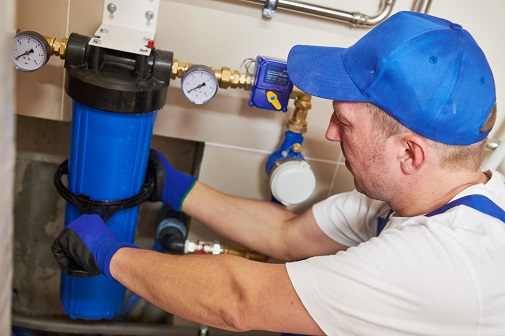Many people are faced with contaminated drinking water and may not even know about it. Unfortunately, lead from old pipes and lots of chlorine from municipal water plants are very common. It is really important to have a home water filter in some form or another to purify your drinking water. Knowing which kind of filter is best depends on the type of contaminant you have.
Every filter has a contaminant that will purify your water against the best. Some are whole-house filters while others are smaller undercounter water filtration systems. It’s important to know which contaminants you are facing. In this article, we will cover some of the most common water contaminants you are likely to find in your home.
1 – Chlorine and chloramine
Most municipalities put chlorine in the water to help keep it from getting viruses or bacteria in it that could be harmful. Although the intention is good, having too much chlorine in the water is not good for some people. It can exacerbate some health problems as well as taste bad and cause dry and itchy skin.
Chloramine is a by-product of chlorine and doesn’t dissipate as easily as chlorine does. If you let water stand for a while, the chlorine will evaporate from it in a few hours depending on the volume.
Getting it out of your water supply will require a filter. Some people prefer a whole house filter for this since they not only don’t want it in their drinking water, but they also want to be able to bathe in water that doesn’t have chlorine. You don’t need a robust filter for this as it can easily be purified with an activated charcoal filter.
In fact, if you are only interested in getting it out of your drinking water then a countertop pitcher filter will generally get most of the chlorine out of the water. Chloramine is more persistent and will require a better filter that can purify the water such as a reverse osmosis system.
2 – Lead
Having lead in your water is a very serious problem. If you have small children they can end up having developmental problems for the rest of their lives due to overexposure to lead. Even adults will have issues if there is lead in the drinking water.
This is likely to happen in areas of the country with failing and old water infrastructure. Although the municipality or county is responsible for removing lead from the water as they have to guarantee healthy water to drink, it doesn’t always happen.
If you suspect that you have lead in your water then get it tested right away. Your town may do this for you for free or they may have already issued an alert for residents to start filtering the water. Boiling the water will have no effect on lead.
Instead, look to get a reverse osmosis filter to remove the lead and give you pure drinking water. You can also use a distillation process to remove it.
3 – Mercury
If you live in an area that historically had a lot of manufacturing then you may have mercury in the water supply. These days there are more regulations in place to make sure that factories aren’t dumping mercury in the ground which would get into the water table. However, a long time ago this wasn’t the case and mercury can stick around for a long time.
Mercury can damage the nervous system and in young children can cause lifelong problems. It is really important to test for mercury to make sure that you are drinking water that is safe.
In case you have a mercury problem you will need a filter such as reverse osmosis, distillation, or a KDF type of filter to remove it.
4 – Organic chemicals
Chemicals that are organic may sound beneficial but are in fact very bad for you. This refers to things like pesticides, herbicides, degreasers, and petroleum products. Those that live in a heavily farmed area will likely have these contaminants in their water.
Overexposure to these chemicals can have a terrible effect on your reproductive system and lead to many issues. To filter them out of your water you should look into filters such as a GAC (Granulated Activated Charcoal) will help. Also, the most effective filter is reverse osmosis since it can remove the tiniest of microns of contaminants and give you pure water.
The Importance of Water Testing
Before selecting any filtration system, comprehensive water testing is an indispensable first step. You cannot effectively treat a problem you have not identified. While municipal water providers are required to publish annual quality reports, these documents offer only a general picture at the point of distribution. They do not account for the potential contaminants introduced by your home’s own plumbing, such as lead from solder or pipes.
A professional test or an accredited home test kit provides the essential blueprint of your water’s unique contaminant profile, revealing the specific types and concentrations of impurities present. This knowledge is the only way to make a truly informed and cost-effective decision, ensuring you invest in a filtration technology that is specifically certified to remove the concerning substances in your water.
This principle of “test first” is especially critical for homeowners relying on a private well, where you are solely responsible for your water’s quality and safety. Regular local well service and repair are essential to prevent contamination from surface runoff, agricultural seepage, worn system parts, or a compromised well casing. A professional well service can test for contaminants common to your area’s groundwater, ensure your pumping system is efficient, and promptly address warning signs like strange taste, sediment, or a drop in water pressure.
Ultimately, the safest strategy combines accurate knowledge from water testing with the correct filtration solution and for well owners, adds the essential layer of regular well maintenance. If you are concerned about your water quality, the path is clear: have your water tested by a qualified professional. The results will provide the definitive roadmap for determining the precise water filtration system your home needs.








